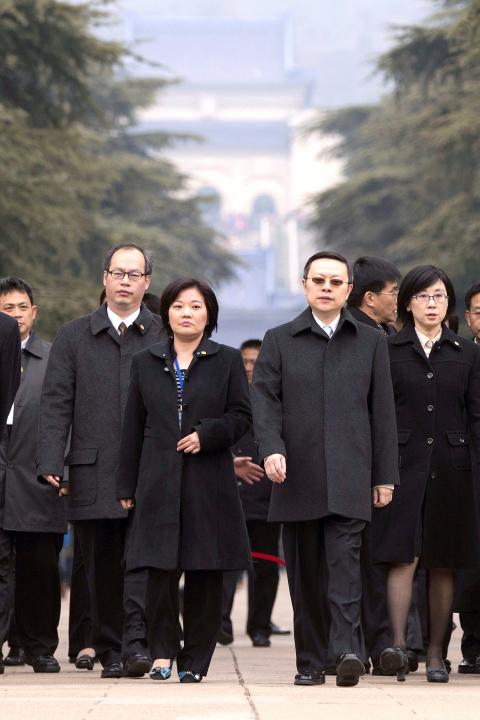Mainland Affairs Council (MAC) Minister Wang Yu-chi (王郁琦) yesterday paid homage to Sun Yat-sen (孫逸仙), the founding father of the Republic of China (ROC), in a visit to Sun’s mausoleum in the Chinese city of Nanjing and mentioned the ROC in his remarks despite Chinese officials and media playing down the comments.
Wang yesterday became the first ROC official to visit the Sun Yat-sen Mausoleum in his official capacity, on the second day of his four-day visit to China.
On Tuesday, Wang and his Chinese counterpart, Taiwan Affairs Office Minister Zhang Zhijun (張志軍), held the first meeting between Taiwanese and Chinese ministers since 1949, when the Chinese Nationalist Party (KMT) fled to Taiwan following its defeat by the Chinese Communist Party in the Chinese Civil War.

Photo:AFP
“It has been 103 years since Sun Yat-sen founded the ROC, the first democracy in Asia. We could in the past only pay tribute to the founding father in Taipei, but I am able to visit here today in my capacity as MAC minister,” Wang told reporters and the crowd in the Boai Plaza in front of the mausoleum.
Several Taiwanese pan-blue camp politicians had visited the mausoleum in the past in non-governmental capacities, including former Straits Exchange Foundation president Chiang Pin-kung (江丙坤), former KMT chairmen Lien Chan (連戰) and Wu Po-hsiung (吳伯雄), and People First Party Chairman James Soong (宋楚瑜).
Taiwan Affairs Office officials were not accompanying Wang when he made the remarks.
In an eulogy Wang recited in front of Sun’s grave earlier, he mentioned Sun’s Three Principles of the People, the five-power Constitution and the so-called “1992 consensus,” also noting that people on both sides of the strait belong to the “Zhonghua” (中華) culture and it was imperative to “face reality.”
Responding to media inquiries about Wang’s remarks, Taiwan Affairs Office spokesperson Ma Xiaoguang (馬曉光) only praised Sun as “a great pioneer of China’s democratic revolution” without elaborating on Wang’s comments, according to China’s state-owned China News Service.
Chinese media, including the state mouthpieces CCTV and the Xinhua news agency, omitted Wang’s remarks about the ROC and the call for “facing reality” in their coverage.
Later yesterday, Wang delivered a speech to Nanjing University students, calling for closer youth exchanges across the Taiwan Strait and “peaceful coexistence.”
Wang’s visit to China so far has drawn mixed responses from the Democratic Progressive Party (DPP) and the Taiwan Solidarity Union (TSU).
DPP Chairman Su Tseng-chang (蘇貞昌) said yesterday that while Wang and Zhang’s addressing each other using their official titles was “a small step for progress,” Wang’s failure to address human rights and the ROC in front of Zhang was lamentable.
In a press release issued late on Tuesday night, the DPP’s Department of China Affairs director Honigmann Hong (洪財隆) described the meeting as a “quasi-political negotiation” without authorization from Taiwanese.
Hong added that the nominal meeting had failed to reach substantial consensus on the issues of press freedom, human rights, investment protection and joint crime-fighting, among others.
TSU Chairman Huang Kun-huei (黃昆輝) said in a press release that Wang’s remarks about the ROC were only “self-amusement” because there was no Chinese official present and the Chinese media would not report about it.
Wang is due to attend a forum and hold talks with Chinese think tanks today before wrapping up his trip and returning to Taipei tomorrow.

Alain Robert, known as the "French Spider-Man," praised Alex Honnold as exceptionally well-prepared after the US climber completed a free solo ascent of Taipei 101 yesterday. Robert said Honnold's ascent of the 508m-tall skyscraper in just more than one-and-a-half hours without using safety ropes or equipment was a remarkable achievement. "This is my life," he said in an interview conducted in French, adding that he liked the feeling of being "on the edge of danger." The 63-year-old Frenchman climbed Taipei 101 using ropes in December 2004, taking about four hours to reach the top. On a one-to-10 scale of difficulty, Robert said Taipei 101

Nipah virus infection is to be officially listed as a category 5 notifiable infectious disease in Taiwan in March, while clinical treatment guidelines are being formulated, the Centers for Disease Control (CDC) said yesterday. With Nipah infections being reported in other countries and considering its relatively high fatality rate, the centers on Jan. 16 announced that it would be listed as a notifiable infectious disease to bolster the nation’s systematic early warning system and increase public awareness, the CDC said. Bangladesh reported four fatal cases last year in separate districts, with three linked to raw date palm sap consumption, CDC Epidemic Intelligence

Two Taiwanese prosecutors were questioned by Chinese security personnel at their hotel during a trip to China’s Henan Province this month, the Mainland Affairs Council (MAC) said yesterday. The officers had personal information on the prosecutors, including “when they were assigned to their posts, their work locations and job titles,” MAC Deputy Minister and spokesman Liang Wen-chieh (梁文傑) said. On top of asking about their agencies and positions, the officers also questioned the prosecutors about the Cross-Strait Joint Crime-Fighting and Judicial Mutual Assistance Agreement, a pact that serves as the framework for Taiwan-China cooperation on combating crime and providing judicial assistance, Liang

US climber Alex Honnold left Taiwan this morning a day after completing a free-solo ascent of Taipei 101, a feat that drew cheers from onlookers and gained widespread international attention. Honnold yesterday scaled the 101-story skyscraper without a rope or safety harness. The climb — the highest urban free-solo ascent ever attempted — took just more than 90 minutes and was streamed live on Netflix. It was covered by major international news outlets including CNN, the New York Times, the Guardian and the Wall Street Journal. As Honnold prepared to leave Taiwan today, he attracted a crowd when he and his wife, Sanni,